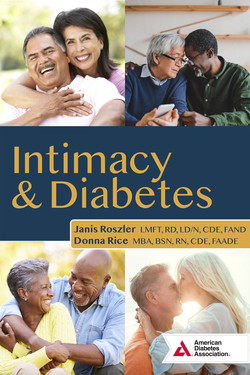Читать книгу Intimacy & Diabetes - Janis Roszler - Страница 23
На сайте Литреса книга снята с продажи.
Оглавление2. Diabetes and Your Feelings11
If you are of African-American, Latino, Native American, Asian American, or Pacific Islander descent
If you were diagnosed with prediabetes
If you have polycystic ovarian syndrome (PCOS)
Think of all of the people you know who are overweight and inactive but don’t have diabetes; not everyone develops it. What you eat, how you behave, and health decisions that you have made over the years are not the sole cause of your disease, so don’t permit overwhelming feelings of guilt to place a wedge between you and your intimate partner.
Your loved one may share your feelings of guilt, especially if this per-son supported your desire to choose junk food over healthier fare, or watch television instead of going for a walk. These feelings can bring a great deal of tension into your world. To help deal with guilty feelings either of you may have, learn as much as you can about diabetes and in-corporate new healthy behaviors in your home. Changes in your attitude toward diabetes can make a real difference.
“Because of my type 2 diabetes, Julie and I can’t be sponta-neous anymore. Before we go out for the evening, we must plan everything around my eating schedule. If my blood glu-cose goes low, we can’t leave until I feel better. If my headache remains after treating my low, we’ll often cancel our plans alto-gether. How can she enjoy this? I sure don’t. If I ate less and exercised more, I wouldn’t have diabetes right now. My fam-ily says that I did this to myself, and I believe them. If I didn’t have diabetes, Julie and I could enjoy more activities together. Instead, I’ve ruined our lives. She should be with someone else.” —Rick
Impact of Guilt on Relationships
